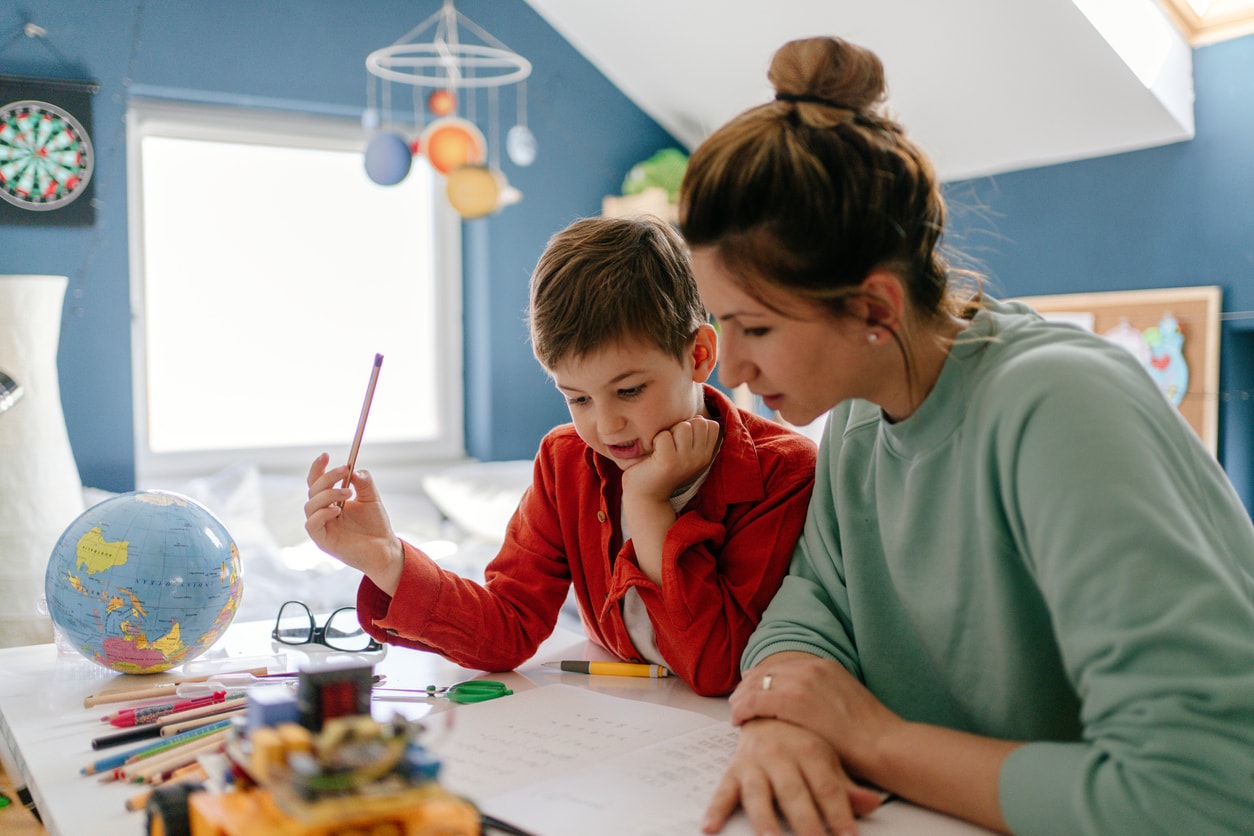As someone who has been chugging along at this parenting gig for over 14 years, if I could gift one thing to my fellow moms, it would be this: I wish we could all see that we are enough. That we are doing a good job, just as we are, and we don’t fall into the motherhood comparison trap. Whether our houses are messy or clean, and whether our kids are throwing a tantrum at Target or sitting in the corner, quietly reading a book. Whether they ate organic homemade muffins or a McDonald’s breakfast sandwich today or whether we work outside the home or from home. Or we’re SAHMs. Whatever grades our kids are getting in school. Whatever weight we are. Whatever clothing size we are.
I wish we mothers knew that we are enough and that we could quit the comparison trap we so often find ourselves in. That comparison trap whittles away at our mental health, making us feel less than the amazing, hardworking, loving, and dedicated women we are.
The Comparison Trap is a No-Win Game
The reality is that far too many of us (me included) have found ourselves trapped inside the unfair comparison trap game over and over. And we never come out of it a winner.
Why can’t my house be organized like hers? Why doesn’t my child excel like that child? Why do her kids listen better than my kids? Why does she always look so effortlessly put together? Why do I look like a messy cat lady wearing my husband’s old T-shirt, and that mom just came floating here wearing a glittery kimono and $100 wedge sandals? Why is she still the same size she was at 25 when my metabolism seems to be on a decade-long vacation?
And all these endless comparisons — our homes, how we look, how much money we have, the vacations we take, our kids’ behavior, our kids’ grades — culminate in one central message to our brains: “Something is wrong with me. I am not enough.”
Why Do We Fall into the Comparison Trap?
So why do we do it, especially when it harms our well-being? In an article, psychotherapist Erika Ames says women and girls are especially prone to comparisons with one another because it is ingrained in us from an early age.1
“Humans are naturally creatures of comparison, but girls and women are especially vulnerable,” Ames explains in the article. “Women are often implicitly trained to look to others for permission and to make sure they’re doing it right. And that urge only gets stronger when women become mothers.”
Therapist Elizabeth Gillette, LCSW, echoes this sentiment in the article by adding that in women’s pursuit to get things’ right,’ we turn to outside sources to help us determine standards “for everything from the cleanliness of our homes to the activities our toddlers should be doing.” 1
And that’s how we find ourselves in the comparison trap. We search for answers and validation. We’re searching for the mythical “parenting book” that explains why our 3-year-old peed in a potted plant at Grandma’s. Or why our 12-year-old suddenly stopped talking to us once they began middle school.
Then we discover that lots of little boys don’t pee in potted plants, and lots of 12-year-olds still talk to their parents even in middle school, so that must mean we are failing and that something is wrong with our kids and us, right?
Of course, nothing is wrong with our kids or us. But that lie creeps into our minds and takes over positive self-talk like, “Hey, I’m doing my best over here” or “My kid is different from anyone else’s kid, and I need to remember that we all have our struggles. It’s okay.”
Worrying About What Others Think Leads to the Comparison Trap
The other reason we get stuck in this toxic comparison cycle is that women tend to worry excessively about what others think. So, if Mary Ellen shows up with Pinterest-perfect cupcakes to a school event and you roll into the grocery store this morning and grab $3 doughnut holes, you feel ashamed that you didn’t live up to her standards. But you’re not Mary Ellen — you’re you — and you’re an awesome mom, store-bought doughnut holes or not. Why can’t you see it? Why can’t any of us see it?
We can’t see how amazing we already are because we tend to put immense pressure on ourselves to be the perfect mom for our kids. We know this motherhood gig is the most important thing we’ll ever do, so we must always get it right. And here, we take on yet another unrealistic expectation we take on that psychotherapist Saba Harouni Lurie, LMFT, says leads us to “search for areas we might be ‘falling short’ in order to improve.”1
Again, we never allow ourselves to feel like enough. We can always do more; our kids can always be better. We can always be better. Perfectionism is a carrot that’s always out of reach. It can never be attained. And the comparison trap keeps that carrot hanging in front of our faces daily as we exhaust ourselves, trying to be the best moms we can be.
How Does the Comparison Trap Impact Our Kids?
Unfortunately, in our quest to be the “perfect mom,” we transfer that pressure onto our kids. Perfect moms have perfect kids, after all. And that’s when we start comparing our children to other children and sending a message damaging their self-esteem. Remember, our kids copy us, like it or not, and if they see, hear, or sense us comparing them to others, they’ll do it too, and this toxic cycle continues.
An article on Healthline explains why the comparison trap of measuring our children against other kids is so harmful. “To set unfair expectations according to how other children are developing is just unrealistic and sets an awful precedent. This is why we need to embrace our kids exactly where they are. We need to let them feel our support and our patience, because when they know they have that—that’s when they start blossoming.”2
Meet Kids Where They Are Instead
I learned this the hard way with my youngest child. My oldest two are natural rule-followers, easily get good grades, and have gotten through most of their childhood without too many challenges. By age two or three, they could sit quietly in a chair and entertain themselves with books. I could take them anywhere and was confident that I could handle any situation.
Child No. 3 brought me to my knees. He struggled to sit in a chair or hold a pencil at age six. Or focus on anything for more than 30 seconds. Books? Ha! Books got ripped or thrown across the room at age three. Everything I knew about parenting was wrong when it came to this child, and I learned quickly that I could not compare him to other kids (or even his siblings), and I had to meet him where he was at each developmental stage.
Even now, at age 10, he is on his own timeline. His bedtime is earlier than his 10-year-old friends because he’s grumpy and emotional otherwise. His writing skills aren’t where his siblings’ skills were in fourth grade. Neither is his overall maturity and ability to regulate his emotions. But constantly expecting him to be someone he’s not would only damage our relationship.
The Healthline article reminds parents that when kids think they don’t have our support, they wilt and might start paying too much attention to what everyone around them is doing. That leads to an inferiority complex.
We want them to grow, not wilt. So, we must keep those comparisons in check.
It’s Easy for Mothers to Fall into the Comparison Trap
No one will fault a mother for falling into the comparison trap. It’s almost inevitable with how much stress and pressure we put on ourselves to do it all, be it all, and never mess up.
Jill A. Stoddard, Ph.D., a psychologist and author of “Be Mighty: A Woman’s Guide to Liberation from Anxiety, Worry, and Stress Using Mindfulness and Acceptance,” addresses how common and easy it is for mothers to end up comparing themselves and their lives to others.
Stoddard says moms often feel like everyone else has a key to life and that others know what to say, how to succeed, and how to be confident, stress-free, and happy, but they don’t.1
What we all need to remember, what we all need to write on a sticky note and slap onto our mirrors so we can read it and repeat it to ourselves daily, is that there is no unique key. The mom who seems to have it all together undoubtedly has struggles you don’t know about. We know this to be true because don’t you have struggles the world doesn’t know about? No one’s life is perfect, even if it looks like it.
Tips to Avoid the Comparison Trap
The following tips might help you avoid the motherhood comparison trap in your life:
Remember That Every Kid is Unique
Continuously remind yourself that every child is unique and needs to be met exactly where they are. If your kindergartner isn’t reading at the same level as their peers, or your three-year-old isn’t getting potty training (but your other kids did at age two), that’s okay. Nothing is wrong with your child or your parenting.
Oh, and Remember: No One’s Life is Perfect
Also, remind yourself that people often only show a highlight reel of their lives to the world and keep their struggles hidden. No one’s life is perfect, even if it seems to you that it is.
Learn Your Triggers
Become aware of and avoid your triggers if you can. If scrolling social media makes you sad or worried, try to cut down the time you spend doing it. If certain friends make you feel less than, try to minimize the time you spend with them. Or remind yourself again that they, too, have struggles, and you have many things to feel grateful for.
Remember What Matters Most
Remind yourself that money doesn’t buy happiness. The happiest people you’ll meet usually have a positive outlook unrelated to material things. Love, connection, friendship, laughter, and making memories with those closest to you — are things that can lead to genuine happiness and fulfillment.
Think of the Small Moments
Think of memories and small moments with your children that bring you joy. If you see a family’s pics online of their trip to Disney and you feel that pang of jealousy or guilt because you can’t afford to take your kids on such a vacation, think about times within the last week or month when your child laughed or smiled or gave you hugs and kisses or seemed genuinely happy. Then remind yourself that you are a fantastic mom, and your children live their full lives, even if they spend spring break at the park.
Focus on the Good Qualities of Others
Focus on emulating good qualities you see in others, like their kindness or generosity. Find inspiration to volunteer and make more sustainable choices. Or put more goodness into the world. Changing your focus and mindset will improve your overall mental health. It will also take up more space in your mind so that you’re less likely to stew over who has a cleaner house or nicer shoes.
The comparison trap is toxic, but sadly, no genie grants mom wishes. And I can’t sprinkle fairy dust on every mom and make her realize she is enough. Trust me; I’d sprinkle some on myself, too! The best I can do is remind my fellow moms that we’re all in this together. We are all doing our best to raise these fabulous little humans who will do good things.
I see you, Mom, and I know how hard you try. And if you’re wearing an old, stained T-shirt at pickup and your house is a mess, please come over for coffee because, same.

 PARENTING TIPS
PARENTING TIPS PREGNANCY
PREGNANCY BABY CARE
BABY CARE TODDLERS
TODDLERS TEENS
TEENS HEALTH CARE
HEALTH CARE ACTIVITIES & CRAFTS
ACTIVITIES & CRAFTS


